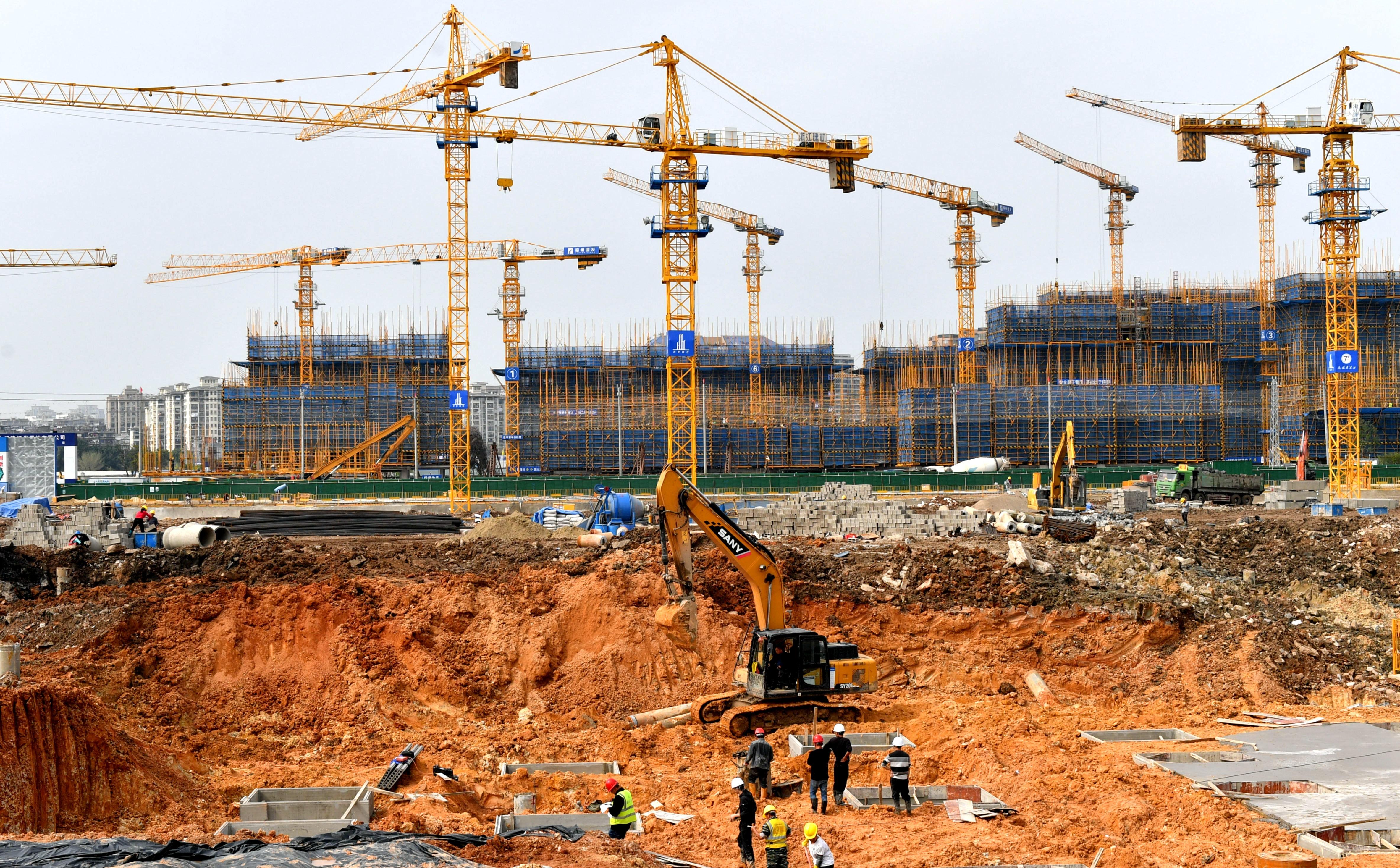Optimized policies, hopes of stronger recovery seen boosting demand
 Salespeople introduce a residential property project to prospective homebuyers in Huizhou, Guangdong province, on March 21. (ZHOU NAN / FOR CHINA DAILY)
Salespeople introduce a residential property project to prospective homebuyers in Huizhou, Guangdong province, on March 21. (ZHOU NAN / FOR CHINA DAILY)
The first May Day holiday in China after the COVID-19 pandemic control measures were optimized saw a mild pickup in property trading — and the uptrend will likely extend into the coming months, considering the macroeconomic acceleration and the anticipated further release of pent-up demand for homes, industry experts said.
The continuous optimization of property-related policies by local governments as well as the ongoing steady economic improvement will set the tone for the real estate market from now on, with hot-spot cities expected to see a more buoyant performance, they said.
Though the volume of deals for residential properties during the five-day holiday was well behind the pre-pandemic levels, transactions in key cities for both new and existing homes saw double-digit growth year-on-year, said Guan Rongxue, a senior analyst with the Zhuge Real Estate Data Research Center.
More than 5,200 new homes were traded between April 29 and May 3 in the 15 cities surveyed by the research center, up nearly 26 percent year-on-year. More than 785 pre-owned homes were also traded in six key cities, up 20 percent year-on-year, the center said.
"The data indicate that both new and existing home markets in many Chinese cities are on course to improvement, boosting market confidence," Guan said.
Pro-market measures introduced to stabilize the market proved effective during the holiday. Sales of homes will further improve and the market will regain stability by the end of this year and might even rebound, Guan said.
"A weak recovery was seen at the beginning of the year. It was followed by a bit of consolidation in key cities in February and March. Sales of commercial properties in March reported first positive year-on-year growth since July 2021," said Xie Chen, head of research with CBRE China, a commercial real estate services and investment firm.
Measures like stabilization of the property market and ensuring timely delivery of residential projects, together with the release of pent-up demand, had supported the improvement of the property market in the first quarter in terms of sales, investment, land bidding and construction, among others, said Yao Yao, head of research at JLL China, a real estate consultancy.
"As the real estate industrial chain is gradually gaining momentum, the industry is expected to form a virtuous circle step by step, and guide market expectation, confidence and capital in the positive direction," Yao said.
 A real estate project is under construction in Fuzhou, Fujian province, on April 1. (PHOTO / CHINA NEWS SERVICE)
A real estate project is under construction in Fuzhou, Fujian province, on April 1. (PHOTO / CHINA NEWS SERVICE)
Agreed Shaun Brodie, senior director and head of occupier research of China at Cushman &Wakefield, a global real estate services firm. "This year, with a good start to China's economic growth, the real estate market in China has recovered and stabilized in terms of a number of key indicators. Ahead, however, there is still further policy work to be done to ensure market stabilization remains a long-term phenomenon."
Industry experts agreed the way ahead may see ups and downs as the market pursues an overall recovery.
After the early spring recovery in the first quarter, major Chinese cities saw a universal retreat in realty deals in April as the supply of newly built houses reached a five-year low across the 30 key cities tracked by China Real Estate Information Corp, or CRIC, a unit of E-House (China) Enterprise Holdings Ltd.
At the same time, trade volume in April declined by 27 percent month-on-month, said Yang Kewei, vice-general manager of CRIC's research center.
"Although home transactions in April rose by 37 percent year-on-year, the figure remained lower than the levels seen between 2019 and 2021, because of the low comparison base of last year, when the pandemic eroded market performance. This shows the market recovery still needs more steam," said Yang.
The bump in the home market in April indicated that market confidence is yet to recover fully, and the digest of the accumulated inelastic demand in the previous months led to a market slowdown, Yang said.
Li Guo, 32, a white-collar professional working for a construction company and a prospective homebuyer, understands the current market situation. He and his wife bought a three-bedroom apartment in 2015 in one of the suburban areas of Hangzhou, Zhejiang province. Since their only child is about to enter primary school in September, the Lis are considering to sell their existing home for a smaller one located in downtown area that is known to be home to better schools.
"But the uncertainties of the home market make it very hard for us to figure out the right timing for selling and then buying," Li said.
With regard to such unstable demand recovery, Xie said he expects more easing in measures in the coming months targeted at supporting inelastic and improving demand, ensuring timely home deliveries and stabilizing the market.
Experts said the Political Bureau of the Communist Party of China Central Committee meeting held on April 28 laid a solid policy foundation for market stabilization in the second half of the year.
 Visitors read information on a rental housing project of Beike, an integrated online and offline platform for housing transactions and services, during Jinling STYLE living festival in Nanjing, Jiangsu province, on April 30. (PHOTO PROVIDED TO CHINA DAILY)
Visitors read information on a rental housing project of Beike, an integrated online and offline platform for housing transactions and services, during Jinling STYLE living festival in Nanjing, Jiangsu province, on April 30. (PHOTO PROVIDED TO CHINA DAILY)
The meeting highlighted the stable and healthy development of the real estate market, the establishment of a new development model for the real estate industry, the need to meet demand for homes for living (not for speculation purposes), market stabilization, raising people's life quality, urbanization, and green and high-quality development, said Yao with JLL.
Property developers will come up with quality products and services via adoption of various methodologies, and at the same time keep an eye on risk prevention, cost control and productivity enhancement. Local governments are tending to launch measures to address their specific situation, and striving to ensure the effective execution of central government policies, said Yao.
Overall, the confidence reflects the great importance accorded to the real estate market and is expected to promote a more stable and healthy development of the market, said Brodie.
"Housing demand is expected to further improve due to the three-child policy and recent economic development. The new trends in China's real estate industry, including the increasing popularity of newly completed homes and the further exploration of flexible housing loan repayment methods, are helping consumers and suppliers improve the quality of cash flow and delivery, thereby further helping restore vitality of the overall economy," Brodie said.
The central government also hopes to further ensure the handover of buildings, protect people's livelihoods and ensure stability through the efforts of local governments, he said.
The meeting also sent positive signals to drive consumption, said Chen Wenjing, director of research with the China Index Academy.
"It indicated that the existing property policies will be maintained in the near future, and the market should continue to stabilize homebuyers' confidence and market expectations," Chen said.
Xie said he believes the weak recovery so far will likely continue in the second quarter. Differentiation between regions, cities and even districts of a city will intensify due to their respective conditions.
The Chinese property market may see gradual stabilization in the second quarter on the back of optimization of local policies and steady economic recovery, Chen said.
"There might be a small-digit month-on-month home sales growth nationwide. Market differentiation might appear from city to city. Hot-spot cities that seek policy optimization and improved supply will remain vigorous, but the vast majority will continue to undergo a market adjustment."



